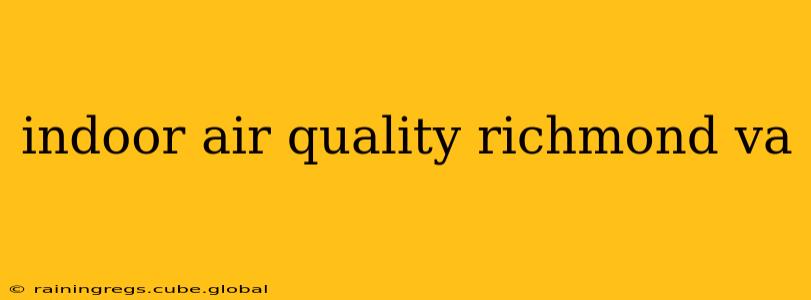Richmond, VA, boasts a rich history and vibrant culture, but the city's older buildings and humid climate can present challenges to indoor air quality. Maintaining healthy indoor air is crucial for the well-being of residents and businesses alike. This comprehensive guide explores the key aspects of indoor air quality in Richmond, providing valuable information for improving the air you breathe.
What Affects Indoor Air Quality in Richmond?
Richmond's climate, with its hot, humid summers and mild winters, contributes to higher humidity levels indoors, which can foster mold growth and dust mite proliferation. Additionally, the age of many buildings in the city means potential exposure to asbestos or lead paint, further impacting air quality. Other factors impacting indoor air quality include:
- Pollen: Richmond's seasonal pollen counts can significantly affect indoor air quality, particularly for allergy sufferers.
- Pet Dander: Pet owners need to be mindful of pet dander as a significant allergen contributor.
- Mold and Mildew: High humidity creates ideal conditions for mold and mildew growth, especially in damp areas like basements and bathrooms.
- Construction and Renovation: Renovations can release dust and harmful particles into the air.
- Combustion Byproducts: Incomplete combustion from gas stoves or furnaces can introduce carbon monoxide and other harmful gases into your home.
- Volatile Organic Compounds (VOCs): VOCs are released from various sources like cleaning products, paints, and furniture.
How Can I Improve Indoor Air Quality in My Richmond Home?
Improving your indoor air quality involves a multi-pronged approach:
Regular Cleaning and Maintenance:
- Air Filters: Change HVAC air filters regularly (at least every 3 months, or more frequently if needed). Consider using HEPA filters for better particle removal.
- Vacuuming and Dusting: Regular vacuuming and dusting help remove allergens and dust mites. Use a vacuum with a HEPA filter.
- Ventilation: Open windows when weather permits to increase airflow and reduce indoor pollutants. Use exhaust fans in bathrooms and kitchens to remove moisture and odors.
- Mold Remediation: Address any visible mold immediately and consider professional mold remediation for extensive problems.
Controlling Humidity:
- Dehumidifiers: Use dehumidifiers to control humidity levels, especially during summer months. Maintaining humidity levels between 30-50% is ideal.
- Proper Ventilation: Ensure proper ventilation in bathrooms and kitchens to prevent moisture buildup.
Air Purifiers:
- HEPA Filters: Consider using air purifiers with HEPA filters to remove airborne particles like dust, pollen, and pet dander. Choose a purifier appropriately sized for the room.
Reducing VOC Exposure:
- Low-VOC Products: Opt for low-VOC paints, cleaning products, and furniture whenever possible.
- Proper Ventilation: Ensure adequate ventilation when using products that release VOCs.
What are the Health Risks Associated with Poor Indoor Air Quality?
Poor indoor air quality can lead to a range of health problems, including:
- Respiratory Issues: Asthma, allergies, and other respiratory infections.
- Eye, Nose, and Throat Irritation: Burning eyes, runny nose, and sore throat.
- Headaches and Dizziness: Symptoms associated with exposure to VOCs or other pollutants.
- More Severe Health Conditions: In severe cases, poor indoor air quality can contribute to more serious health problems.
How Can I Test My Indoor Air Quality?
Testing your indoor air quality can help identify specific pollutants and determine the extent of the problem. You can purchase DIY test kits or contact a professional indoor air quality specialist in Richmond for a thorough assessment.
What are the best ways to prevent indoor air quality problems?
Proactive measures are key to preventing indoor air quality problems. These include regular maintenance, proper ventilation, controlling humidity, using low-VOC products, and promptly addressing any mold issues. Regular cleaning and air filter changes are vital parts of this process.
Where can I find indoor air quality services in Richmond, VA?
Many HVAC companies and specialized indoor air quality businesses in Richmond offer testing, remediation, and improvement services. You can search online for "indoor air quality Richmond VA" to locate professionals in your area.
This guide provides a starting point for improving your indoor air quality in Richmond, VA. Remember to prioritize regular maintenance and address any potential problems promptly to ensure a healthy and comfortable living environment.
